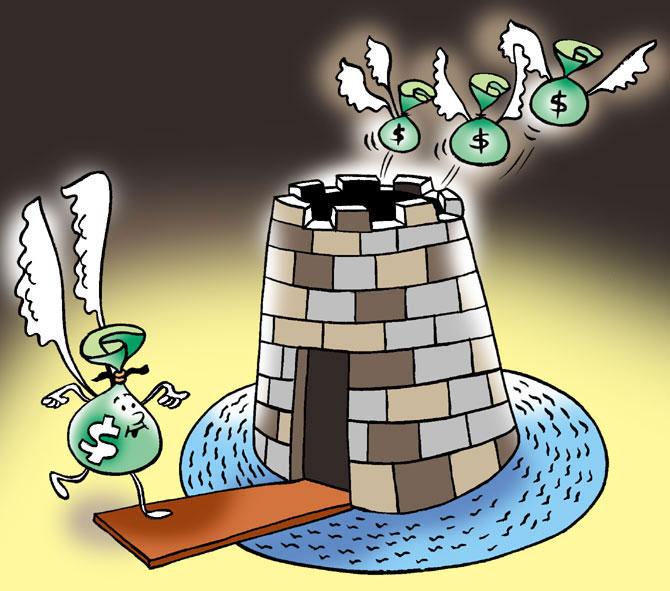While a coordinated aggressive monetary easing from the central banks is most likely to offer some respite in the near-term, it is unlikely to improve the sentiments.

Outflow from the Indian capital markets could pick up pace if foreign institutional investors (FIIs) continue to remain in a risk-off phase, given the coronavirus pandemic that has tightened its grip over most economies, say analysts.
Adopting a cautious approach amid the worldwide outbreak, foreign portfolio investors (FPIs) have already pulled out a net Rs 36,221 crore ($4.96 billion) from the Indian capital markets in the past 13 trading days.
“For FPIs/FIIs, it is more of a global risk-off and not just about India. While the health scare has dampened investor sentiment across the globe, India benefits from the sharp fall in oil prices seen over the past few sessions.
"As regards coronavirus, we have been relatively unaffected as compared to the developed nations.
"Thus, the main reason why the FIIs are exiting is the risk-off.
"So long this persists, India will not be spared,” explains U R Bhat, managing director at Dalton Capital.
According to the latest depositories data, FPIs have pulled out Rs 32,746 crore ($4.49 billion) from the equity segment between February 24 and March 11, 2020.
On Thursday, FPIs sold a net amount of Rs 3,475 crore ($471 million).
This translates into a total net outflow of Rs 36,221 crore during the period.
With Thursday’s fall, the Sensex and Nifty have tanked a massive 20 per cent in just 13 trading days.
Domestic mutual funds have bought a net Rs 15,128 crore from the equities.
Nischal Maheshwari, ceo for institutional equities & advisory at Centrum Broking, too, echoes a similar view and expects the markets to remain fragile and respond negatively to virus-related developments and dwindling global economic indicators.
“Given the ongoing global risk sentiment, investors are flocking to safe-haven asset classes and avoiding risky emerging market asset classes.
"Given the global health scare, the Indian economy may enjoy the position of being less vulnerable to such shocks,” Maheshwari said.
While a coordinated and aggressive monetary easing from the RBI is most likely to offer some respite in the near-term, it is unlikely to improve sentiments substantially unless there are signs of abating, analysts say.
As regards the impact of COVID-19, analysts at UBS suggest the market is pricing in global growth at only 2 per cent, compared to a long-term average of 3.5 per cent, 4 per cent prior to pandemic worries, and 2.8 per cent before the talks with Opec on oil demand and supply broke down.
“The quick ‘double shock’ has meant that this has been the sharpest eight-week decline in growth expectations since the global financial crisis.
"Even so, as long as the flow of new cases is rising, the low is likely not yet in place for a number of risk assets.
"If the virus can be contained, global equities should make new stimulus-powered highs by end-2020. In the intermediate scenario, we still see a recovery in H2, but not enough to keep returns positive for the year,” wrote Arend Kapteyn, global head of economics, strategy research, and chief economist of UBS Investment Bank in a recent report.











